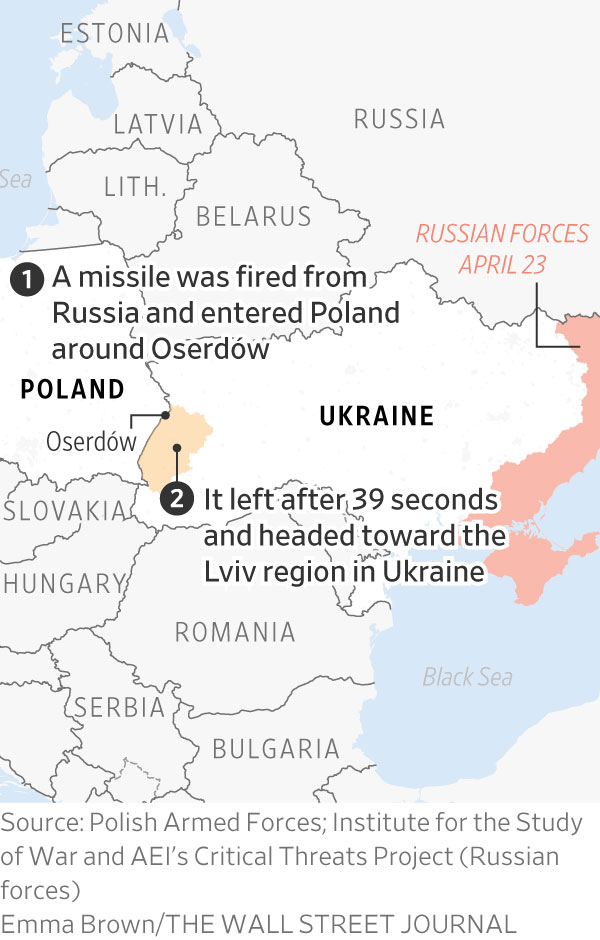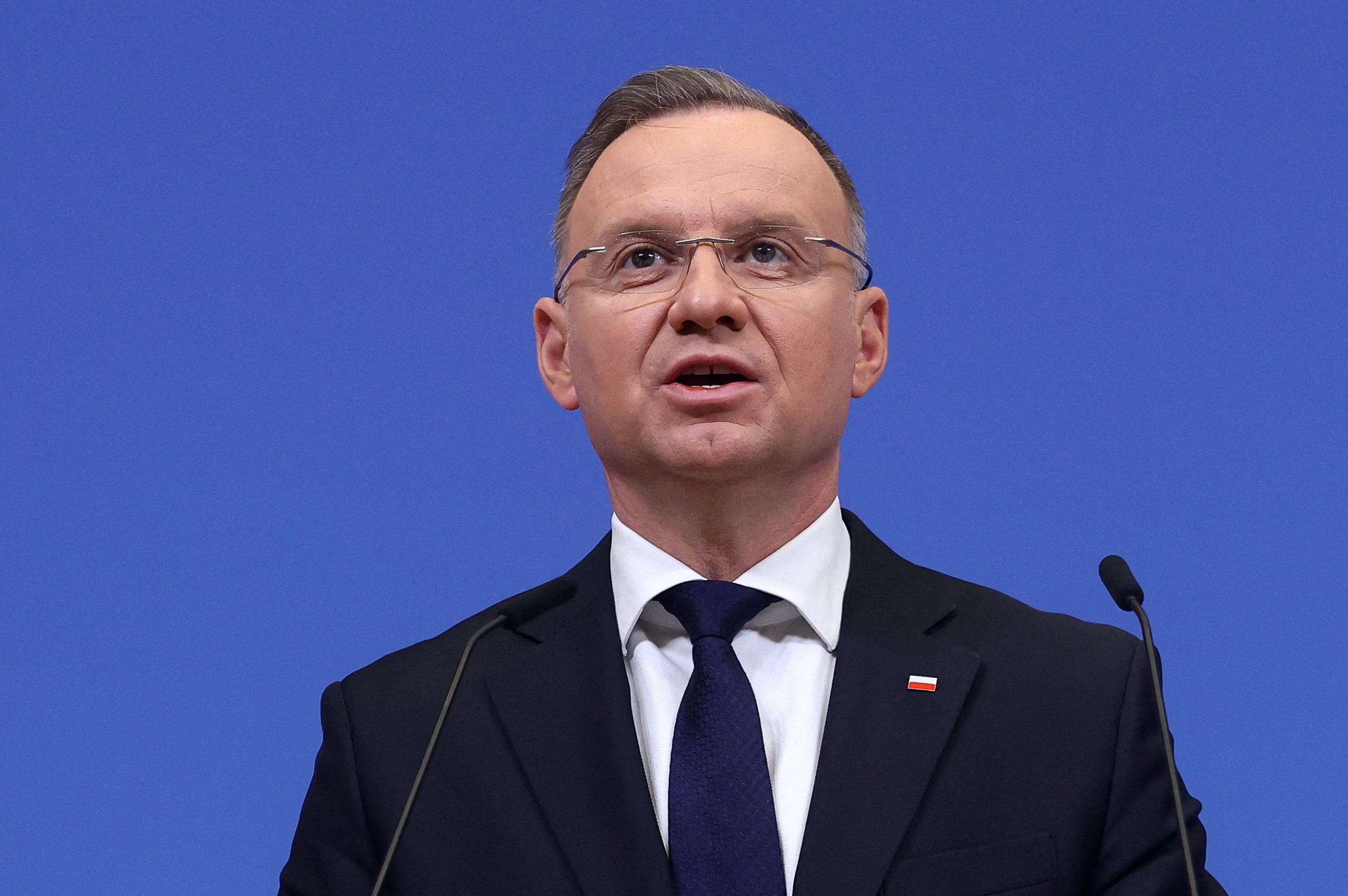Russia has fired several missiles at Ukraine that have crossed into Polish airspace since 2022, a provocative show of force by Moscow that risks igniting a wider war, according to Poland’s president.
The most recent incident was on March 24, when a Russian cruise missile targeting western Ukraine entered Polish airspace for 39 seconds, according to the Polish armed forces.
“We have no doubt whatsoever that these are Russian provocations, and we have no doubts that it is a Russian provocation when there is a missile entering our airspace, then it turns around and it goes into Ukraine,” Polish President Andrzej Duda told The Wall Street Journal in an interview last week.
 While North Atlantic Treaty Organization forces so far haven’t attempted to intercept the missiles, Duda said his concern is that one could end up striking Polish territory, destroying infrastructure or causing casualties.
While North Atlantic Treaty Organization forces so far haven’t attempted to intercept the missiles, Duda said his concern is that one could end up striking Polish territory, destroying infrastructure or causing casualties.
“That is the most dangerous situation that we could imagine today, because that is a situation in which we could say that Russia has started a war,” he said shortly before he met in New York with former President Donald Trump , the presumptive Republican nominee.
There have been at least three known incidents of Russian missiles entering Polish airspace since the start of the Ukraine war, including one that struck near a NATO training site. The cases are forcing Polish and allied forces to consider how to respond , including whether to attempt to intercept future launches that breach the border.
A shootdown over Polish airspace could cause casualties from the resulting debris, but NATO members are also wary about shooting down Russian missiles over Ukraine—a direct involvement in the conflict that alliance members have avoided, Duda said.
“Ukrainians are saying, ‘Yes,’ but our NATO partners are saying, ‘Do not do it beyond NATO territory,’ and this is a problem,” he said.
With Kyiv’s air-defense systems under strain, Russia in recent weeks has launched a fresh round of missile strikes at Ukraine, including the Lviv region, not far from the Polish border. The trajectory of those missiles often takes them close to—and in some cases over—the NATO border, according to western officials.
“We have seen those provocations,” Duda said. “Our airspace was infringed by Russian missiles several times.”
The Russian Ministry of Defense didn’t respond to a request for comment.
“Russian missiles have repeatedly violated allied airspace” since 2022, according to a NATO official, who declined to detail the number of cross-border incidents. Cases of Russian military aircraft entering NATO airspace “remain rare and generally of short duration,” the official said.
“We strongly condemn any and all violations of NATO airspace, which are irresponsible and potentially dangerous,” the official said.
An American official said the U.S. hasn’t determined whether the Russian incursions are intentional.
Justin Bronk , a senior research fellow at the Royal United Services Institute in London who studies air power and technology, said that one or two incursions could be a guidance failure, but more frequent breaches would likely be deliberate.
The Russians “have taken care to minimize even the risks of missiles ending up in NATO territory through malfunctions in flight,” he said.
The prospect of Russian missiles striking Poland has been a concern since the early days of the Ukraine war. In November 2022, a projectile crashed near the southern Polish town of Przewodów, killing two agricultural workers and triggering concerns about the war spilling over into NATO.
Immediately after the incident, Duda ordered the drafting of an official note asking NATO to invoke Article Four of the alliance’s founding treaty, which allows members to request consultations on a security issue and is regarded as a potential trigger for a major alliance response.
Within 24 hours, however, the Polish government determined that the projectile wasn’t a Russian missile but a Ukrainian air-defense interceptor that had gone off course. The Polish note was never sent. “I can tell you that that was a very difficult night,” Duda said.
The following month, however, a Russian missile did penetrate Polish airspace and flew more than halfway across the country, eventually crashing down not far from a NATO training site. No one was injured. The incident triggered an investigation in Poland and renewed questions inside NATO over how to respond to potential air threats.
Another breach occurred in December 2023, when Russia launched one of the biggest missile and drone attacks of the war against Ukrainian cities. One projectile spent three minutes speeding across Polish airspace, the country’s armed forces said at the time.
Moscow’s senior diplomat in Poland said afterward that Warsaw hadn’t submitted proof a Russian missile had breached the border, according to RIA Novosti, a Russian-state owned news agency.
NATO has beefed up its air defenses along its eastern flank, including in Poland, with additional ground-based defense systems and aircraft. Poland has several layers of air-defense systems, including American Patriot batteries that could intercept missiles, as well as fighter aircraft.
When projectiles enter Polish airspace, they are typically picked up on radar and NATO aircraft scrambled to respond. To date, though, no Russian missile has been shot down.
Poland’s Defense Ministry wouldn’t provide further details about the incursions. “Details of the exact figures for the use of Polish and allied aviation in such operations are classified information,” the ministry said in a statement.
A source familiar with the issue said Polish jets had been scrambled more than 1,000 times to respond to potential threats at the border since Russia invaded Ukraine more than two years ago.
Duda declined to say how his country would respond if a Russian missile did cause casualties in Poland, or whether he would attempt to invoke NATO’s collective defense agreement.
“I believe that we should try to avoid a situation in which Russia could say that it was provoked by NATO,” he said. “So far it is Russia which has been provoking and everybody can see that.”
Write to Sharon Weinberger at sharon.weinberger@wsj.com



